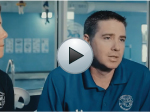To show our support of and investment in our local community, First National Bank is "shining a spotlight" on our business customers in the Omaha World Herald. We appreciate the opportunity to be a part of our customers' journeys and successes and want to share their stories with you.
Video
2016 Articles
Imperial Wagyu Beef - October 31, 2016
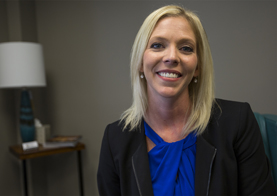
From pasture to plate, Omaha-based Imperial Wagyu Beef is on a mission to produce and market all natural, premium Wagyu beef products that are “a cut above” when it comes to taste, tenderness and healthful benefits.
“Wagyu is a breed of cattle that originated in Japan,” explained Tami Tibben, president and partner of Imperial Wagyu Beef. “The breed is prized by leading chefs and food authorities for its superior meat quality resulting from the amount and distribution of marbling, which are the flecks of intramuscular fat that give beef its flavor.”
As the first employee of Imperial Wagyu Beef, Tibben has seen the company grow from a handful of producers in 2008 to its current size with nearly 80 producers from across the nation, including Hawaii.
Imperial Wagyu Beef is raised on American family farms by producers who share the vision of raising cattle using humane and sustainable management methods.
“Imperial Wagyu Beef utilizes a holistic production system, meaning from the beginning to end,” according to Tibben. “Several companies in our industry are either cattle producers or beef wholesalers, whereas we are involved in every step of the process, from pasture to plate.”
Imperial Wagyu Beef producer partners follow strict cattle production, feeding and management guidelines to achieve consistently marbled, flavorful cuts of beef.
“We strive to deliver the ultimate experience,” Tibben acknowledged. “Wagyu beef gives you more of a velvety, buttery-smooth texture and a whole different mouth feel than beef from conventional cattle. And because it is higher in monounsaturated fatty acids as well as omega-3 and omega-6 fatty acids, it is also a healthier option. Universities have done studies that show it can actually help reduce cholesterol.”
Imperial Wagyu Beef’s three feed yards are located in Clarinda and Vallisca, Iowa, and Craig, Nebraska. Cattle are fed a nutritionist-approved, all-vegetarian diet for a minimum of 400 days compared to 120 days for conventional cattle breeds.
“We care about our animals,” Tibben emphasized. “All of our animals are raised outdoors in a low-stress environment, which is crucial to their performing at a peak level. We prohibit the use of growth promotants, hormones and antibiotics. This is a slow-growing breed and we prefer to produce the highest quality product possible.”
As the first Certified Wagyu Beef brand in the U.S., Imperial Wagyu Beef is sold through a network of specialty distributors who supply premium products to high-end restaurants, upscale butcher shops, luxury hotels, country clubs and resorts. Also, a select variety of products are available for purchase online at imperialwagyubeef.com.
For the past seven years, Tibben and her staff have hosted a “Behind the Scenes” farm tour and tasting designed to further educate producers, customers and associates about the company and the Wagyu breed of cattle.
“There are many chefs who don’t realize how Wagyu cattle are raised,” Tibben observed. “It’s exciting to get them together with producers to learn about our holistic production system.”
Among the 90 attendees at this year’s event were chefs, producers and a representative from First National Bank, who was present for the entire event from the welcoming session to the five-course Wagyu beef dinner.
“Without First National Bank, we would not be where we are today,” Tibben added. “They are a great partner. They are easy to talk to, a great resource when questions arise and very responsive. This business requires a lot of capital and they are an instrumental part of the plan for future growth.”
Noddle Companies - October 24, 2016

As the second generation President and Chief Executive Officer (CEO) of the Omaha-based Noddle Companies, Jay Noddle and partner Joe Kirshenbaum have witnessed dramatic changes in the commercial real estate development and property management business over the past 40 years.
“Technology has changed in every way,” according to Noddle. “Today, technology allows us to take a deeper dive into a building’s design before it is ever drawn and constructed. It gives us the ability to think through how a building or a space is going to function and shows us how the building will fit in with its neighbors and the overall environment.”
The growing emphasis on “green building” and Leadership in Energy & Environmental Design (LEED) has also had a significant impact on commercial and industrial projects. LEED certification is nationally recognized as a benchmark for the design, construction and operation of buildings that are friendly to the environment.
“Sustainability is a core value for our company,” Noddle explained. “We have been successful in designing and delivering several LEED Gold certified buildings over the years. Our latest project involving HDR’s corporate headquarters will be Gold certified under LEED Version 4, which involves a whole new set of standards.”
Founded by the late Harlan Noddle in 1971 and later joined by Kirshenbaum in 1972, Noddle Companies grew from a handful of employees to its current 36-person staff of design, construction and property management specialists. Jay Noddle became President and CEO of the firm in 2003 and has worked alongside partner Kirshenbaum ever since. “We are a very lean organization,” Noddle acknowledged. “We have a wonderful group of people internally and fantastic outside partners who all enjoy working with one another.”
While serving as President of Grubb & Ellis/Pacific Realty prior to joining his father’s firm, Noddle was involved with two high-profile developments that helped to shape the Omaha community in the early and late 1990s. Those projects were the 300- acre First National Business Park west of 132nd and Dodge Streets and the seven-block campus for First National Bank in downtown Omaha, which includes the 40-story First National Tower.
“That led to the redevelopment of downtown Omaha by spurring commitments from the Omaha World- Herald, Union Pacific, the Gallup Riverfront Campus, and eventually the CenturyLink Center and TD Ameritrade Park Omaha,” Noddle shared.
Today, Noddle Companies’ project portfolio includes more than 150 office, retail and commercial properties in 17 states. Among its signature developments are Aksarben Village, the Kiewit Innovation, Learning and Leadership Facility and the General Services Administration (GSA) FBI facility. The company is also master developer for the new “Rivers Edge” mixed use project in Council Bluffs, Iowa, and the 500-acre tract being developed with Applied Underwriters near 144th Street and West Dodge Road.
“We have more projects underway than we have ever had before,” Noddle shared. “It’s exciting and a bit scary at times, so it is reassuring to know that the leadership team at First National Bank is here to help us any way they can.”
Citing his decades-long partnership with First National, Noddle is grateful for the financial and leadership support he has received over the years.
“Noddle Companies would not be able to achieve the success we have thus far absent our relationship with First National Bank and their decision makers,” Noddle added. “They bring not only great thinking, they bring a wealth of experience and wisdom to the table that’s extremely beneficial.”
Preferred Popcorn - October 17, 2016

The town of Chapman, Nebraska, with a population of less than 300, seems an unlikely place to find the global headquarters of one of the largest popcorn manufacturers in the world.
"When we started the company it was quite small with just three of us," recalled Norm Krug, a second generation popcorn grower and Chief Executive Officer of Preferred Popcorn LLC. "It was an interesting startup. We had a small garage that we remodeled into our office and ended up working in that space for 14 years. Today, we have around 81 employees in four states."
Founded in 1998 by Krug, three other farmers, and a local coop in a dormant processing plant, Preferred Popcorn processed its first international shipment the following year. Today, the company has international sales in 70 countries including China, Japan, Indonesia, Mexico, and in the U.S.
"During my first trip to Japan I remember thinking, ‘What is a farmer from Chapman, Nebraska, doing in Tokyo?’” Krug shared. “When I met with the company’s CEO, I gave him a Nebraska Cornhusker t-shirt, which he wore into his board meeting. It turned out he had been in Omaha and liked the Huskers. We started a business relationship that still continues to this day."
While much of Krug’s time is spent traveling to trade shows and meeting with existing and potential customers, he still farms in Nebraska where more than 300 million pounds of popcorn is grown annually. The company markets five distinctly different types of premium popcorn.
"One of the advantages we have with our farm background is we’re quite familiar with the different varieties of popcorn," Krug explained. "We plant our own test plots each year using more than 100 different varieties that we’re studying for different characteristics. Because of our experience growing popcorn, we are able to develop the hybrids that fit our customers’ needs."
Over the years, major company milestones have included the 2010 acquisition of Preston Farms in Palmyra, Indiana, and the 2012 purchase of Ellis Popcorn in Murray, Kentucky. Last year, the company acquired K&W Popcorn, a leading provider of certified organic popcorn in Trenton, Missouri.
"We are seeing an increase in demand for organic products, both domestically and in international markets," Krug observed. "With that acquisition, we were able to immediately supply our domestic and international customers with organic popcorn."
This year, the company increased the storage capacity at its Chapman plant with the addition of 10 new bins where popcorn is stored and carefully monitored for temperature and moisture levels prior to being packaged.
"We have to pay close attention to how popcorn is maintained and conditioned throughout the year," Krug explained. "All of our popcorn is stored and conditioned under carefully regulated settings so the highest quality is maintained."
Throughout the company’s recent growth and plant expansion, Krug has relied on First National Bank for its depth of services and ongoing financial support.
"Most importantly, the team at First National Bank is supportive of what we’re trying to do," Krug acknowledged. "The ownership and leadership of the bank believes in developing Nebraska companies and they couldn’t have been better in supporting our desire to export. They believe in our vision and are behind us in every way and we appreciate having a strong banking partner in First National Bank."
Tecumseh Poultry - October 10, 2016
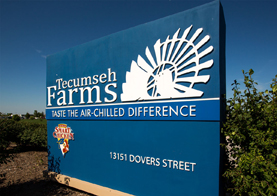
When Tecumseh Poultry introduced its Smart Chicken brand to the U.S. market in 1999, commercial poultry companies offering air-chilled chicken were as scarce as hen’s teeth.
“Our processing plant in Tecumseh was the first air-chilled facility in the nation,” explained company President and Chief Executive Officer Kevin Siebert. “We were also the first facility to use controlled atmosphere stunning, and one of the first companies to produce all of our chickens without the use of antibiotics.”
Each of these innovations, and many others to follow, represented points of differentiation between Smart Chicken and other U.S. poultry companies.
“The idea was to look at ways of raising and processing chickens that would yield a superior quality tasting and eating-experience product,” Siebert emphasized. “From the start, we have methodically considered processes and innovations that will enhance the quality of our product.”
Tecumseh Poultry has stayed on the cutting edge of technology by pioneering the use of controlled atmosphere stunning technology, which puts birds to sleep gently and slowly before being processed. This technology was cited by the Humane Farm Animal Care group when it awarded Tecumseh Poultry its “Certified Humane Raised and Handled” label in 2007.
Smart Chicken brand products are airchilled during processing instead of the traditional industry method of immersing chickens in tanks of cold water where they can absorb up to 10 percent of their weight in moisture.
“Water is an artificial ingredient added during processing that is either going to purge out into the tray as the product warms, or you’re going to cook it out, which affects the quality and flavor of the chicken,” Siebert explained. “With air chilling, you are not introducing an artificial ingredient so the natural juices and flavor of the meat are retained.”
Other innovations introduced by the company over the years include:
- Feeding a 100 percent vegetarian diet that contains no animal byproducts.
- Becoming one of the first poultry companies to add a line of certified organic chickens.
- Vision grading to maximize the quality and appearance of the final product.
- Advanced forecasting, data collection and analytic systems that track products, monitor equipment and enhance food safety.
Today, the Smart Chicken brand is sold in 50 states where accounts are managed by a staff of 30 dedicated sales representatives who work directly with procurement specialists in each store.
“It is fairly unique to this industry to have that type of presence and staff,” Siebert acknowledged. “Much of their time is spent in the stores educating shoppers and store personnel about Smart Chicken. They are also trained to closely observe consumer habits and identify trends so that we can continue to improve our product offerings.”
In 2006, the company opened its new headquarters and a packaging and distribution plant in Waverly, Nebraska. Last year, the Tecumseh plant upgraded its equipment and expanded its production capacity by 50 percent with a new 30,000-square-foot addition.
First National Bank was cited by Siebert for its support of company day to day operations, as well as infrastructure and equipment needs.
“First National Bank has been a very good partner for us during the past 10 years,” Siebert emphasized. “During that time, they have been a strong facilitator for cash management and capital needs when it came to making improvements to our facilities and equipment.”
Long Dog Fat Cat - October 3, 2016
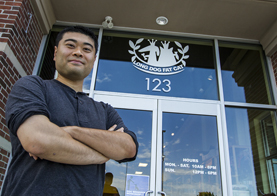
At Long Dog Fat Cat natural pet food stores, every day is Bring Your Pet to Work Day for owners Kazu Gotoh and Indre Seibutyte and their employees. And the welcome mat is always out for canine and feline visitors accompanied by their human companions.
“Both Indre and I love dogs and cats,” according to Kazu. “Our employees share our passion and are very knowledgeable when it comes to answering our customers’ food-related questions. Our staff’s dedication to quality customer service is what really sets us apart from our competition and helps us build excellent rapport with our customers.”
With two convenient locations in Village Pointe South and Loveland Centre near 90th and Center Streets, Long Dog Fat Cat offers a wide selection of dry, canned, raw and freeze dried natural pet foods and treats as well as accessories and grooming services. Customers will also find supplements such as glucosamine for breeds that tend to have joint issues and fish and coconut oils that help keep fur coats looking shiny and clean.
As exchange students attending the University of Nebraska Omaha, Kazu and Indre recall the difficulty they had finding natural pet food brands at an affordable price, which led to their opening the Village Pointe store in 2009. Indre came to the U.S. from Lithuania while Kazu is from Japan.
“Pet food nutrition is not complicated, but it still requires dedication on the part of dog and cat owners,” Indre explained. “Many commercial pet products being sold today contain fillers such as rice, wheat and soy. Feeding your pet a steady diet of food containing fillers would be equivalent to feeding your child fast food for three meals a day, every day.”
Among the specialty products available at Long Dog Fat Cat are handmade bakery items and treats, including cupcakes, donuts, natural puppy blueberry cheesecake, customized doggie birthday cakes and frozen yogurt.
“We don’t use any sugar or additives, so our bakery treats are healthy for dogs,” Indre pointed out.
Birthday cakes are made with chicken, peanut butter and other flavors requested by customers, while the frozen yogurt contains probiotics that are healthful to pets. Yogurt is available in several flavors including Pumpkin Pie, Strawberry/Banana, Cranberry Blast, and Blueberry and Honey.
Stress-free grooming is another trademark of Long Dog Fat Cat, where dog owners are expected to pick up their pet at a specified time. “We do not put dogs in a cage,” Kazu emphasized.
The stores are also popular gathering spots on weekends for rescue organizations including Big Red Rescue, Muddy Paws Second Hand Rescue, Nebraska Dachshund Rescue, Northern Plains Boxer Rescue, and Hands, Hearts and Paws.
A complete listing of products, services and rescue events is available on the company’s website at longdogfatcat.com, which Kazu maintains under the alias of his Pomeranian named “Gosha.” The website features a helpful blog covering topics such as shedding, dog allergies and reasons why cats keep you up at night.
The entrepreneurs appreciate the friendly service and advice they receive as business customers of First National Bank.
“It has always been a real pleasure doing business with First National Bank,” Kazu noted. “They have always been very helpful and provided us with valuable information on what other retailers are doing that can help us to grow. We are always looking for opportunities to provide new services to our customers.”
Maria Bonita - September 26, 2016

What started with a dream of one day opening a family restaurant, has become a reality for the owners of Maria Bonita Mexican Cuisine restaurant and catering business, which is also home base for a pair of food trucks recognized for their bold graphics and tasty burritos.
“If you’re familiar with Mexican culture, our traditional colors are very bright and vibrant,” explained cofounder Itzel Lopez. “The artwork was inspired by my grandmother’s garden that was full of colors, so our food trucks stand out when people see them on the street.”
Colorful murals by local artist Mike Giron also liven the décor of the Maria Bonita restaurant at 52nd and L Streets, where customers can order from a full menu of casero-style dishes including antojitios (appetizers), burritos, enchiladas, tacos, tortas and quesadillas.
“Casero basically means homemade,” according to Dayana Lopez, who is assistant manager at the restaurant. “Our flavors are very vibrant and that’s what makes us unique. We stay with our original family recipes and our customers love them.”
The restaurant features a salsa station with five different styles of salsa made fresh daily from locally purchased ingredients, as well as a Mexican luncheon buffet.
“Customers can choose salsas with mild to really spicy flavors served with our homemade chips,” Dayana shared. “And everyone who comes to Maria Bonita has guacamole. Everything we serve is homemade.”
Among the restaurant’s signature dishes is Enchiladas Verdes, spinach and artichoke filled enchiladas coated with a creamy spinach salsa. Another specialty is Alambres consisting of grilled steak, chicken and shrimp fajitas covered with melted cheese.
The authentic recipes are a family tradition prepared by Miriam and Miguel Lopez who opened the original Maria Bonita restaurant at 19th and Missouri Avenue in 2009. Both were chefs at other Omaha restaurants prior to starting their own business.
“Cooking is in my parents blood, so they handle the cuisine side of the business,” Itzel emphasized. “My sister, Dayana, has a huge impact as manager of our website and social media, while I handle most of the administrative work other family members run other aspects of the business.”
Catering corporate events, graduations, weddings and other special occasions is another important part of the business.
“In addition to offering box lunches and full-pan options, we cater with our food trucks, which is unique,” according to Itzel. “We have capacity to cater gatherings of 500 people or more.”
The family’s emphasis on quality and innovation has earned the restaurant positive reviews from food critics, customers and Omaha Magazine’s “Best of Omaha” designation in the food truck category for three years running.
“Our customers are our cheerleaders, constantly tweeting us and responding to various events that we cater,” Itzel observed. “When people experience Maria Bonita, it’s hard to let go.”
Itzel credited First National Bank and the Nebraska Enterprise Fund (NEF) for believing in her family’s vision.
“Without the help of First National Bank, we would not be here,” Itzel insisted. “First National has been a proud supporter of Maria Bonita starting with our first restaurant. We come in for advice, we share our dreams and they believe in us. We have been delighted to work with them from the beginning to where we are today. They treat us like family.”
Chili Dawg's - September 19, 2016
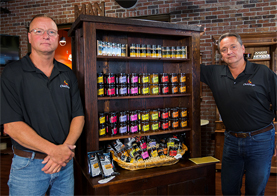
From its early days as a homebased business, to its steady growth across a multi-state region, Chili Dawg’s Foods of Fire has been turning up the heat at parties, cookouts, tailgates and barbecue competitions with its peppery product line. Leading the list of hot sellers are several habanero pepper spreads, seasonings and jerky created from homemade recipes by company owners Tim and Shawn O’Dell.
“We both love fiery foods,” Tim explained. “Our first product was a sweet and spicy habanero pepper spread that my wife and I created in our kitchen, which we used to give away as Christmas gifts and bring to tailgate parties. Our friends and relatives kept encouraging us to market the product, so in 2005 I founded the company with my brother, Shawn.”
The brothers attribute their early success to the University of Nebraska Lincoln’s Food Entrepreneur Assistance Program (FEAP) where they learned to navigate regulatory hurdles such as designing a product label that follows Food and Drug Administration guidelines.
“We went through a three-day seminar that taught us how to take a food product from concept to market, which is what we did with our habanero pepper spread that featured an apple lemon blend that we named Hablemeno,” Shawn recalled.
Through the FEAP program, the O’Dells located a contract manufacturer and began marketing Hablemeno at trade shows in Nebraska, Iowa, Missouri and Texas, including the American Royal in Kansas City, which is the world’s largest barbecue competition.
“At the first American Royal show we attended, we sold more than 60 cases of our Hablemeno pepper spread in two days,” Shawn recalled. “Seeing the customers respond to that one product encouraged us to keep going and develop new recipes.”
Over the years, the brothers continued operating out of their homes as they added several new flavors to their line of habanero pepper spreads, including Strawbanero, Peachbanero, Habricot and Razbanero, which can be used as a spread for toast, a glaze on meat, or a barbecue sauce.
In 2014, the brothers achieved a major milestone when they opened a retail location and warehouse at 1940 Ridgeview Road in Blair, Nebraska, where visitors are encouraged to “try it before you buy it.” The store attracts customers from throughout the Midwest with its wide selection of hot and spicy products and barbecue supplies, including grills and smokers.
In addition to its retail location, Chili Dawg’s Foods of Fire are available at major barbecue trade shows and online at www.chilidawgs.com. Products are also sold at selected Hy-Vee, Family Fare, Fareway Foods, and Affiliated Food grocery stores throughout a 14-state area, as well as convenience and specialty stores.
The O’Dells credit their partnership with First National Bank as instrumental in their company’s success.
“First National Bank has been with us through all the ups and downs, the valleys as well as the good times,” Tim shared.“They meet with us regularly about our business and are always asking us about our needs.They have been very supportive and a great partner.”
2015 Articles
T&E Cattle Company - November 2, 2015

At T&E Cattle Company located on the outskirts of Grand Island, Nebraska, thirdgeneration owner and operator, Greg Baxter, draws a sharp contrast between his grandfather’s feedlot operation from the early 1930s and the family’s current multifaceted business. “When my father was young, he and my grandfather fed cattle with a team of horses that pulled the wagon while they hand-scooped feed into the bunks,” Baxter recalled. “In 1969, when my grandfather passed away, there was a total of four employees, including my grandfather and my dad, and our capacity was 3,500 head of cattle.”
Today, T&E Cattle Company is the largest commercial feedlot in Hall County with 30 full-time employees and a 20,000 head capacity. Multiple rations prepared by a consulting nutritionist are mixed and weighed in a fully computerized feed mill that automatically measures and sorts feed ingredients according to individual pens of cattle. “At any given time, we will have seven to nine different nutritionally balanced rations we will feed to cattle, depending on how much they weigh, how long they’ve been on feed, and the customer’s ultimate goals,” Baxter shared. “Our fully computerized feed mill facility automatically measures and weighs the feed ingredients for each ration, which is then loaded onto feed trucks equipped with iPads that direct the driver to the appropriate pen. Everything is communicated through radio frequencies directly into the office billing system for accuracy.”
The company has evolved over the years to include a cow-calf operation, risk management and marketing services, residential, commercial and industrial land development, and a 3,000-acre farm enterprise specializing in corn production. The feedlot, however, remains at the heart of the family’s business. “Our commitment to the feedlot has made the company a success,” Baxter acknowledged. “I’ve always viewed the cattle feedlot as our home plate. Other business opportunities will come and go, but this is definitely the core business that we’re focused on. It’s near and dear to our hearts.”
Baxter is also proud of the company’s ongoing involvement with the Grand Island community, which spans more than 80 years. His grandfather, Ray, was the first president of Fonner Park, a non-profit organization that is host to numerous events, including live thoroughbred racing, a 4-H Horse Exposition, the Nebraska State Fair, and Hall County Fair. His father, Tom, also served as president of the organization and Greg currently serves on its executive board.
“With the City of Grand Island ‘next door,’ I look at it like we have 50,000 neighbors who we need to manage a relationship with,” explained Baxter. “Managing the facility to keep the pens visually presentable and cleaned up is part of being a responsible neighbor. From an operations standpoint, by keeping those pens in better condition, we are going to get improved performance out of the cattle because it definitely enhances their health.”
The Baxter family has also been active in numerous professional organizations, including the National Cattlemen’s Beef Association, the Nebraska Cattlemen Association, and the Sandhills Cattle Association, to name a few. While attending a meeting of the Sandhills Cattlemen’s Association in the early 1990s, Baxter was impressed with a presentation by a speaker representing the AgriBusiness Division of First National Bank of Omaha. Years later, that occasion led to a business relationship with First National that has lasted more than two decades.
“Our relationship has always been open and transparent with First National Bank, and I’m very comfortable sitting down with them to analyze where the opportunities are and where the pitfalls are,” Baxter acknowledged. “First National Bank has been a very strong supporter of our business, as well as the beef cattle industry in Nebraska in general.”
Taylor & Martin, Inc. - October 26, 2015
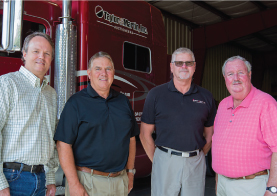
Since 1935, when Charlie Taylor and Ron Martin sold livestock and farm equipment in Fremont, Nebraska, to its current focus on the transportation industry, Taylor and Martin, Inc., has steered a steady course to become the nation’s leading over-the-road trucking auctioneer. With more than $200 million in sales in 2014, the company is on another record-setting pace this year. “We’re the people who sell more tractors and trailers than anyone else and that’s all we do is sell over-the road trucks,” according to Paul Wachter, president of Taylor & Martin. “We sell an average of 12,000 to 15,000 tractors and trailers every year. We’ve done several bankruptcy auctions and some complete dispersals of trucking firms that ranged in size from 3,000 to nearly 8,000 tractors and trailers or more.”
Since joining Taylor & Martin in 1980, Wachter has seen the number of auctions nearly double from 20 per year to more than 40, which include online bidding that accounts for nearly 25 percent of sales. “At the time I started, there were probably 15 full-time employees compared to 66 people on staff today,” Wachter observed. “A big auction back then would be $1 million in sales. Today, a big auction is $10 to $12 million.”
A corporate airplane stored at the Fremont Municipal Airport enables company officials to maintain their hectic travel schedule to auction venues across the U.S. In addition to its corporate headquarters located in Fremont the company owns auction sites in South Sioux City, Nebraska, and Tunica, Mississippi, where multiple sales are held each year. For other locations, Taylor & Martin’s specially equipped auction trailer is brought onsite where an office manager and a team of sales representatives process title transfers and other sales-related paperwork. With memberships in 45 state trucking associations, Taylor & Martin is a full-service auction company that offers a broad range of specialty services, including equipment inspections, clean-up and detailing, appraisals, warranty analysis, consultation, and title processing. All sales brochures, catalogs, and advertising are prepared by office personnel in Fremont and printed in Sioux City, Iowa.
“We have an appraisal department that appraises more than $4 billion worth of trucking equipment for financial institutions each year,” Wachter shared. “We also have two full-time international coordinators to help with translation for our Hispanic customers, and a full-time travel agent.” Wachter credits the company’s success over the years to the expertise and integrity of its officers and employees. “We have to deal with every single type of tractor, trailer, and piece of support equipment in the trucking industry,” Wachter emphasized. “You need to know all of the brands and all of the specifications, and that takes experience.”
Taylor & Martin has benefited from a long relationship with advisors at First National Bank Fremont and First National Bank of Omaha who understand the unique nature of the auctioneering business, according to Jessup Wilson, chief executive officer and treasurer. “Many bankers would have trouble with our financial statement because it’s constantly moving between assets and liabilities,” Wilson noted. “The financial advisors at First National Bank understand our industry, what it is we do, and why our balance sheet fluctuates so much.” This summer, Taylor & Martin began a new chapter in its corporate history by introducing an employee stock ownership plan (ESOP) to its workforce. The plan provides an ownership interest in the company to its current and future employees. “We feel we have the best employees in the industry,” Wachter added. “This is a way for us to keep the heritage of Taylor & Martin alive.”
SGH, Inc. - October 19, 2015

Throughout the Midwest, landmark buildings such as the Holland Performing Arts Center, Strategic Air Command Center, First National Tower Winter Garden, and Henry Doorly Zoo owe many of their iconic design features to customized exterior building products provided by SGH, Inc. A part of the Omaha-based Redglaze Group, SGH has been vitalizing communities with its quality exterior skins and translucent daylighting products for commercial buildings since 1974. “Being a part of changing the landscape of a city makes you feel really proud when you drive around,” explained company CEO Dean Jessick. “You look at where downtown Omaha was in 1990 compared to where it is today, it’s completely different. Projects like the First National Tower, Landmark Center, and Union Pacific have really transformed the downtown community.”
Named for early owners Ken Swanson, Gregor Gentleman and Richard Hart, the company’s product portfolio contains more than 20 customized exterior and interior building products distributed through a network of offices in Iowa, Minnesota, North and South Dakota, Kansas, Missouri, Colorado, and Montana. The privately held company also provides consultative and installation services to national projects such as the Toyota Image USA II Branding Upgrade initiative. “The Toyota project involves the design and installation of an illuminated portal on the front of its dealerships across the nation,” Jessick explained. “We’ve installed more than $100 million in construction portals for nearly 1,000 dealerships scattered across the country, making it the single biggest project we’ve ever done.”
It was during his work with Toyota that Jessick developed internal quality management systems that enabled the company to reduce the installation time for each portal from three weeks to four days or less. “Toyota is all about continuous improvement,” Jessick observed. “Working with Toyota has made us a better company by holding us accountable. Now we’re implementing our quality systems for all of our other projects.” Since its initial work on the portals, the group has managed other programs for Toyota, including all the metal wall claddings and glazing systems. “To date, we’ve helped manage more than $300 million worth of construction for Toyota,” Jessick estimated.
All of the products in the company’s portfolio are engineered for aesthetics, sustainability, and energy efficiency. Among the energy-efficient products on display in the company’s flagship office at 742 N. 109th Court, is a complete wall system engineered and patented by SGH – the Genwall Single Pass™ Enhanced Substrate System™. “Genwall is probably going to be our flagship product moving forward,” according to Jessick. “The fully tested wall system is gaining major traction with close to one million square feet of product already contracted to be installed. We’re currently promoting it in our regional markets and are setting up a nationwide distribution network.”
Jessick credits the company’s success in recent years to its 45-member staff, as well as nearly 60 subcontractors from the various territories served by SGH. “We have the most dedicated, loyal employees in the world,” he acknowledged. “I cannot say enough about the people who are in our organization.”
Jessick also appreciates the mentoring he received from former owners Gregor Gentleman, Richard Hart, and Theodore Hazer, and the financial services provided by First National Bank since 1992. Gregor Gentleman and Richard Hart lined up our opportunity to purchase SGH in 1999 and First National Bank made it happen,” Jessick shared. “When we were exercising our purchase options, we needed a very strong bank behind us because SGH was highly leveraged. First National Bank stuck with us and since then they’ve done everything to help us grow.”
Swimtastic - October 12, 2015
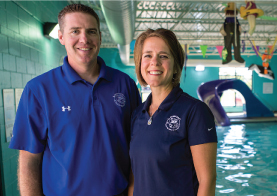
With its signature water slide, palm tree shower, imaginative decorations, and specially trained instructors, the Swimtastic Swim School has been making a splash with Omaha families for more than a decade. Under the ownership of Meagan and David Sall, the swim school is part of the Swimtastic franchised network with locations in Wisconsin, Nebraska, and Florida. A former swimming instructor in Minneapolis, Meagan Sall is a proponent of Swimtastic’s learn-to-swim program that is tailored to the emotional and developmental abilities of each individual swimmer. This approach requires instructors with unique teaching skills and qualifications.
“Instructors need to love children – that’s the first thing,” Meagan emphasized. “We really take pride in our staff. Our managers and teachers are very creative and are always coming up with songs and decorations for the various themes that we have every week. Our instructors have a passion for working with kids, and having fun, which the children really pick up on.” Now in its tenth year of operation, the swim school at 2920 N. 118th Circle has provided instruction to more than 2,000 swimmers since opening. The school conducts four sessions per year consisting of 175 classes organized according to age groups, which range from six-month-old “swim babies” to children capable of swimming 100 feet or more using breathing techniques. The maximum class size is four students.
“We start out with the baby classes, which have a parent in the pool with the child,” Meagan explained. “In these classes, the babies learn to hold their breath and put their face in the water. After that, we have individual sessions for two year olds, three year olds, four year olds, and up through adults. So it’s great for the whole family.”
Safety is emphasized by instructors throughout the quarterly sessions. “We pride ourselves on teaching our students safety skills such as how to get to the side of the pool if they fall into the water, or what to do if they get tired in the water and feel cramps,” Meagan shared. David Sall believes that swimming is a life skill that anyone and everyone can benefit from learning. “A few years ago, one of our instructors brought in some developmentally challenged children and taught them to swim,” he recalled. “Being in the water really helped these children. One parent told me her child had finally found a sport that allowed him to be just like all the other kids.”
In addition to swim lessons, Swimtastic schedules extra-curricular activities such as weekend birthday parties, family swimming, and Aqua Pilates for adults. The indoor pool is maintained at a constant 90 degrees Fahrenheit, while humidity is kept at 50 to 55 percent, creating a comfortable environment year-round. An ultraviolet (UV) disinfectant system helps to ensure water and air quality. “It’s been a great ten years,” according to Meagan, who credited much of the school’s success to the financial support provided by First National Bank of Omaha that enabled them to retire their commercial loan and replace the indoor pool’s equipment when needed.
David recalled when the pool’s dehumidifier went down a few years ago and First National responded quickly to refinance a replacement unit. “When the dehumidifier goes down, the humidity in the pool room becomes too high, so timing was critical,” he noted. “First National has given us great advice when we’ve needed it,” Meagan added. “Whenever we need advice, we always go to them and feel secure there.”
Omaha Performing Arts - October 5, 2015
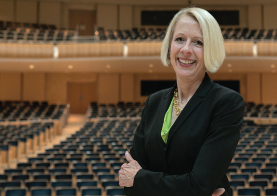
A decade has passed since the first performance was held at the Holland Performing Arts Center, 13th and Douglas Streets, but the memories of that opening night remain unforgettable for Joan Squires, president of Omaha Performing Arts (OPA). “Sitting in the audience as a children’s chorus sang the Star Spangled Banner, I got teary,” Squires recalled. “It was just extraordinary thinking about all the people who came together to make that opening possible and then to finally be experiencing a live performance.”
Under the stewardship of OPA over the past decade, more than three million visitors have attended performances by world-class artists and entertainers at the Holland Center and Orpheum Theater, 409 S. 16th St. In addition, approximately 200,000 students have participated in OPA’s education and community engagement programs, and nearly 60,000 visitors attend the organization’s free Jazz on the Green summer concert series at the Midtown Crossing. “We are extraordinarily fortunate here in Omaha to have the Holland Center and the Orpheum Theater,” Squires acknowledged. Both buildings are signature landmark facilities, not just for this community, but across the country. The wonderful acoustics in the Holland Center are amazing and the ornate beauty of the Orpheum is renowned. Performers love appearing in both venues.”
When Squires started at OPA she had a desk, a computer, and an assistant production manager. Today, the organization has more than 50 full-time staff members, 50 part-time employees, 600 volunteers, and sponsors more than 250 events per year. Over the past decade, OPA has set Orpheum Theater attendance records with Broadway shows like Disney’s “The Lion King,” and headline entertainers like Tony Bennett, James Taylor, Yo-Yo Ma, and Wynton Marsalis at the Holland Center. A 10th Anniversary celebration at the Holland Center will feature actress and singer Kristin Chenoweth on October 16, followed on October 17 by a full day of free entertainment that includes a concert by Conor Oberst.
Representing Nebraska’s largest arts institution, OPA has an annual economic impact of $40 million in Douglas County. Both the Holland Center and Orpheum Theater have been recognized among the best theater venues in the nation by national industry trade publications. Squires credited the success of OPA to the generosity of the community and the ongoing support of the people attending the performances, as well as the organization’s board of directors, administrative staff, and founding donors such as First National Bank of Omaha.
“As a founding donor, First National Bank has been incredibly generous to us,” Squires explained. “First National Bank’s sponsorship of our performances has really helped Omaha Performing Arts present these great artists and performances to the community. As a tribute to the generosity of the Lauritzen family and the bank, we have dedicated a First National Bank lobby at the Holland Center and the Lauritzen Lobby at the Orpheum Theater.” First National Bank was the original credit card processor for Ticket Omaha, which is the official retailer for the Orpheum Theater and the Holland Center, as well as the Omaha Symphony, Opera Omaha, and the Omaha Community Playhouse.
Looking ahead to the next decade, Squires emphasized, “The future is all about connecting to the region, to reaching young people, and really ensuring that we get a chance to participate with everyone in this great community. You really touch lives throught hearts and that is a tremendous gift that we’re able to give to the community.”
Visiting Nurse Association - September 28, 2015
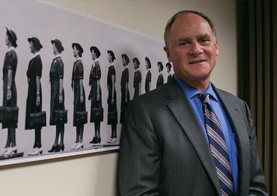
From its inception nearly 120 years ago, the Visiting Nurse Association (VNA) has been “The Face of Care” dedicated to improving the health and lives of people in Omaha and surrounding communities.This tradition is evident at the VNA headquarters, 12565 West Center Road, where walls and meeting rooms are decorated with enlargements of historic black and white photos depicting early scenes of nurses attending to patients at their homes or local shelters.
“Services in the early years were largely bedside care of the sick and poor,” explained James C. Summerfelt, president and chief executive officer of the VNA. “Volunteers under the direction of VNA founder Anna Millard organized a diet kitchen where they supplied food for the sick and provided bedding and layettes. In 1911, bab ysummer camps were started in Riverview Park that later developed into year-round child health clinics.” Today, the VNA has a staff of 410 employees and 100 volunteers who cover Douglas and Sarpy counties in Nebraska, and Pottawattamie County in Iowa. Outreach programs also extend into Dodge, Saunders, Washington and Burt counties in Nebraska.
“Ninety-five percent of what we do is still in people’s homes, or in homeless shelters where some of our patients call home,” according to Summerfelt. “We go where people live, work, and play. Outside of the home, the other five percent of our nurses go into schools, or into businesses to give flu shots.” The range of services provided by the VNA has increased dramatically in recent years and includes physical, occupational, and speech therapists, dietitians, medical social workers, home health aides, and non-medical caregivers for private-pay clients. Typically, post-acute care requires a higher level of nursing skill and is usually ordered and directed by a physician, whereas companion care is arranged by the family.
VNA over the years to the quality of care provided by its clinicians and caregivers. “Our most valuable asset is our employees,” he acknowledged. “Without their service, the care they provide, and their compassion and professionalism out in the community, the VNA wouldn’t exist.” The VNA administrator is also proud of the organization’s use of technology to provide improved health care services to its patients.
“We were the first home care organization to be part of the Nebraska Health Information Initiative, which has allowed us to better transition people from the hospital to home by accessing their health records,”Summerfelt shared. “We were also an early adopter of telehealth technology, which allows patients at home to monitor their vital signs such as weight, blood pressure, and oxygen levels. This information is transmitted to the VNA office for evaluation by a nurse who alerts the patient when data is outside of normal limits.”
Although the VNA has had a business relationship with First National Bank for more than two decades, the histories of the two organizations date back to the mid-1920s. “For many years, members of the Davis family that owned the bank served as officers on our Board of Trustees,” Summerfelt recalled. “The bank has supported us with contributions and been involved with our annual Art and Soup fundraising event, proceeds from which make up a large portion of the nearly $300,000 annual cost of providing care in area homeless shelters. First National Bank has been a very strong and consistent supporter of that event and the VNA.”
Nebraska Air Filter - September 21, 2015
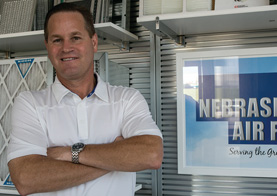
A leaking water main in the dead of winter was the last thing John Jackson expected on his first day as the new owner and manager of Nebraska Air Filter. Faced with a Metropolitan Utilities District order directing the immediate repair of the eight-inch water main that connected to the building’s sprinkler system, Jackson found himself deeply immersed in discussions with plumbers and the utility company over liability issues.
“For a first day, it was a bit harrowing,” Jackson recalled. “But it was a great lesson on what it means to be out on your own as a business owner.”
Founded as Nebraska Coal Company in 1940, the business evolved as an independent distributor of air filters to commercial and industrial customers throughout Nebraska, with limited sales in parts of Iowa, South Dakota, Kansas, and Missouri. The company also manufactures customized filters that are shipped to businesses operating on both coasts.
“Nebraska Air Filter was the first company in the area to provide filtration sales and services of every type to commercial and industrial business,” according to Jackson. “In recent years, as attention has focused on environmental and indoor air quality issues, businesses have become much more conscious of the air filtration they’re using in their buildings.”
As a member of the National Air Filtration Association (NAFA) and the American Society of Heating, Refrigerating and Air Conditioning Engineers (ASHRAE), Jackson understands the importance of proper air filtration in maintaining heating and air conditioning equipment.
“A dirty filter can stress the motor in your air conditioning unit,” he emphasized. “Whether you are a homeowner or you manage a large commercial operation, good filter maintenance can help you avoid costly repair bills and use energy more efficiently.”
Over the years, Nebraska Air Filter has expanded its footprint from its original location near 30th and Leavenworth Streets in Omaha to other sites around the city. Fifteen years ago the company moved to its current 25,000-square-foot office and warehouse at 4221 S. 90th St.
“Our warehouse maintains a 30-day inventory of air filtration products purchased from leading manufacturers, as well as specialized filters that we manufacture in-house to meet the specific needs of our customers,” Jackson explained. “Our filters range in size from less than a cubic inch costing pennies apiece to large industrial filtersfor specialized applications that are priced upward of $1,000 each.”
Jackson credits the company’s success to a knowledgeable sales and distribution staff and experienced service technicians who operate out of five specially equipped trucks to replace filters at customer locations. “Our staff collectively has more than 100 years of experience in air filtration,” Jackson observed. “When a customer has a tricky problem, we can almost always help them solve it.”
Jackson also values his relationships with trusted partners in areas like accounting, law, insurance and banking. Among those partners is First National Bank. “With First National Bank’s online banking, we can check the balances on our accounts and transfer and make payments online,” Jackson acknowledged. “We can also make all our deposits remotely from here in the shop, so the bank is sophisticated enough to make things easy for us.” Jackson added, “Nebraska Air Filter has much in common with First National Bank in terms of length of service within the community and our shared emphasis on always putting our customers first by providing them what they need and helping them solve problems.”
Aromas Coffeehouse & Bliss Bakery - September 14, 2015
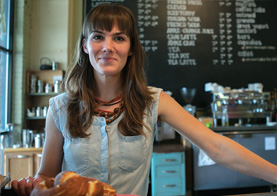
What’s in a name? Five years ago, when Autumn Pruitt was considering names for her bakery at 1031 Jones St. in Omaha’s Old Market, she decided to keep things simple. “We are trying to offer our customers a piece of happiness,” Pruitt explained. “It’s amazing how a delicious cup of coffee and a made-from-scratch cupcake can brighten your day. It’s a simple pleasure and the name Bliss really captures that in one small word.”
Reflecting on her early days of ownership, Pruitt cited the pride she felt as an Omaha native to be part of the downtown business community. “While driving with my sister into work one morning at 4 a.m. I remember seeing the downtown skyline and thinking for the first time that I own a piece of that—I have a key to a building in the Old Market,” she explained. At first, Pruitt relied heavily on her parents, husband, close family members, and friends who contributed countless hours outside their full-time jobs to help in the kitchen. “My husband would work all day long as a worship arts pastor with a local church, then come down to the bakery and wash dishes and mop the floors,” she recalled.
The fledgling coffeehouse and bakery gained national notoriety a few months after opening when Pruitt was invited to submit an audition tape to the Food Network’s “Cupcake Wars.” That led to her appearance as a contestant on the syndicated TV show produced in Los Angeles. “We didn’t win, but it was a valuable life lesson about what can come from trying something,” Pruitt shared. “It was an opportunity to get our name out in the Omaha area and to meet customers who had never heard of us before. And whenever the show appears in a rerun, we see a new wave of customers come in.” The growing popularity of the coffeehouse and bakery has enabled Pruitt to increase her staff to 32 full-time and part-time employees and managers.
“I don’t think I can say strongly enough how remarkable our staff is,” Pruitt acknowledged. “Our team is made up of people who take pride in what they do, who have passion for the product, and a real vision for what we are doing in the community.” Two years ago, Pruitt remodeled the Old Market location and opened a second coffeehouse in the resurgent Benson business district. Earlier this year, she launched the Hardy Coffee Co., a coffee roasting company with retail distribution, and added a selection of healthy lunch items to the bakery’s menu. Later this year, a third coffeehouse location will be part of a new food hall opening at the Westroads Mall in Flagship Commons.
Pruitt said First National Bank has been a valuable partner throughout the company’s recent expansion. She initiated a business banking relationship with First National after another bank failed to meet her own expectations for customer service.“ We have been very pleased with our relationship with First National,” Pruitt noted. “They act like a neighborhood bank even though they’re a much larger organization.” Describing the past five years as “a bit of a blur,” Pruitt has maintained her customer focus with each new enterprise.
“We have an incredible customer base,” Pruitt emphasized. “Our regular customers are what keep our doors open. We are committed to the quality experience that our customers have come to expect and are eager to win over new folks through that process.”
Archive
Jack and Mary's - November 3, 2014
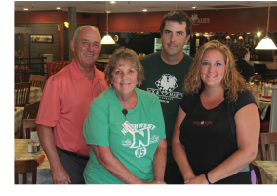
Four years ago when retired Omaha Police Officer Ken Oetter became the owner of Jack & Mary’s restaurant at 655 N. 114th St., he never imagined his new career would land him in hot water. “On occasions when we get busy, my wife and I will grab aprons and help with dishwashing,” Ken explained. “I’m surprised at how much work is required—it can get absolutely stressful. As a police officer I’ve dealt with high levels of stress and sometimes this place can push it." Jack & Mary’s restaurant has been an Omaha tradition for more than 40 years. Originally named Jack & Mary’s Cliff House, the restaurant was located in Old Mill Centre prior to moving to its current address.
The restaurant offers a full menu, including steaks, seafood, burgers, sandwiches, salads, breakfast items served anytime and a full bar, but its signature dish under its various owners has remained fried chicken, coleslaw, mashed potatoes and gravy. “Our menu features food that the original owner called ‘farm food,’” explained Ken’s son, Kip, who is the restaurant’s general manager. “Our fried chicken, gravy, and coleslaw recipes date back to the 1930s. How many restaurants can say that?”
The restaurant serves an average of 9,000 pounds of chicken each month, according to Kip. “Three fourths of our bone-in chicken sales are fried and the rest are grilled,” he noted. “I’ve never seen anyone cut chicken like we do, but this is the way it was done on the farm so that everyone could have a different piece of the chicken.” Catering and carryout represent a large part of Jack and Mary’s business. “About one-third of our total revenue is carryout,” Kip acknowledged. “Our carryout counter has a computer and two telephones, and on Sunday night we have three people at that station because we get so busy. We will do 150 to 200 carryout orders, which is uncommon for a restaurant setting like this.”
Families and older couples are among the regular customers who frequent Jack and Mary’s. “We have some customers who come in here every night of the week,” Kip observed. “Some older couples will split a large chicken dinner because they’re unable to eat a full portion themselves. We see young couples come in with kids and the next thing you know they’re hanging off our statue of Rex, which Guinness lists as the largest rooster in the world.”
One advantage of the restaurant’s current location is its proximity to First National Bank at 114th and West Dodge Road. “We chose to go there from day one because it’s right across the street,” noted Ken, who is responsible for managing the restaurant’s finances. “When our point-of-sale system malfunctioned, the bank provided a loan so we could replace it.” First National Bank was also able to refinance the restaurant’s original purchase loan and provide a lower rate. “We refinanced and it worked out really well,” Ken added. “I’m very happy with the bank and the people who work there, from the tellers to the loan officers.”
Anthony's Steakhouse - October 27, 2014
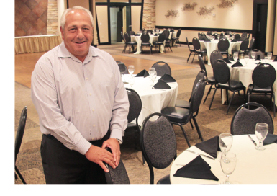
Steaks, a friendly atmosphere, live music in the lounge, and that iconic fiberglass steer. These are all trademarks of Anthony’s Steakhouse, 72nd and F Streets, which has been an Omaha dining tradition for more than 45 years. Named for Anthony Fucinaro, Sr., who died last year at the age of 82, the steakhouse opened in 1967 with a 130-seat dining room, 70-seat lounge, and a packaged liquor store. After a fire in 1969, the dining area and lounge were expanded, and banquet facilities replaced the liquor store, increasing overall capacity to more than 900 seats.
The current owner of the steakhouse, Anthony Fucinaro, Jr., credits the success of the restaurant to his father’s strong work ethic and instinct for creating a dining and entertainment experiene that gained a loyal customer base over the years. “My father was the best people person you’ll ever meet and everybody enjoyed him,” Fucinaro explained. “He was a fun man to be around who knew how to treat people. And even though he lacked experience in the food industry, he was able to learn as he went along and became very successful.”
While attending school, Fucinaro worked for his father on weekends and during summer vacations, learning every phase of the business from cleaning floors to tending bar. “There isn’t a single job in this building that I haven’t done,” according to Fucinaro. “That was a requirement of my father. He made sure I knew how to do everything so I would have a well rounded background in this business. Without his leadership, I would never be able to do this.”
As one of Omaha’s original Italian steakhouses, Anthony’s is famous for its selection of steaks, seafood, and pasta dishes made from family recipes. Leading the list of best sellers on the menu are Anthony’s filet mignon, prime rib, and ribeye marinated in bourbon and flame broiled. Adding to the dining experience is Anthony’s inviting atmosphere where customers are made to feel welcome and appreciated. “We are fortunate to have some very good employees here and with their help, we’re going to continue to give our customers what they want,” Fucinaro emphasized.
The past decade has seen a number of major renovation projects at Anthony’s, including a complete remodel of the Ozone Lounge, where live music is played six nights a week. “Everybody wants to go out, dance and have fun,” Fucinaro noted. “And from a talent standpoint, there are so many good musicians in Omaha, it’s unbelievable.”
In 2008, Anthony’s renovated its 350-plus seat banquet facility with a business loan from First National Bank. Improvements included adding an outdoor patio, the latest audio and video technology, and a full-time events coordinator to help schedule and plan wedding receptions, anniversary parties, and business meetings. Fucinaro plans to renovate the main dining room sometime in the near future.
“Without the help of First National Bank, I probably would have never remodeled the banquet facility,” Fucinaro acknowledged. “I have to feel comfortable with what I’m doing and they make you feel that way. It’s been a very good relationship and I really enjoy working with my business banker and the other people I’ve met. They are professional and look after my best interests.”
Urgent Pet Care - October 13, 2014
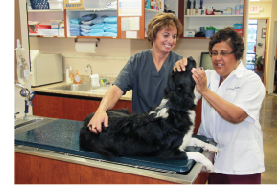
Doris Starks, DVM, and Debbie Newhouse, LVT, CVPM, are used to burning the midnight oil, getting barked at by their patients, and dealing with hissy fits. Still, the owners of Urgent Pet Care, 8419 S. 73rd Plaza in Papillion, are living their dream. “Pets are our passion,” Newhouse explained. “It’s truly satisfying to help people in a crisis situation and hopefully get a pet on its way to recovery.” With business hours from 5 p.m. to 1 a.m. Monday through Friday, 8 a.m to 12 a.m. on Saturday, and 7 a.m. to 10 p.m. on Sunday, Urgent Pet Care doesn’t perform general practice procedures, such as vaccinations.
"We function as an emergency unit,” according to Starks. “We do everything from ear infections, limping, bloat problems and lacerations, to issues with breathing and heat stroke. We also see a fair number of pets hit by cars. And we do surgeries as well.” Since opening in May 2013, Urgent Pet Care has experienced steady growth, accompanied by an increase in staff from three to ten employees. Referrals from area veterinary clinics and rescue groups have accounted for much of that growth.
“If the referring veterinarian has a case that is critical and needs to be monitored overnight from surgery, the patient is brought to us for care through the night,” Newhouse explained. “Even after we have closed, our staff is still here until 7:30 a.m. to care for the patients we have. Someone is always here so we can provide optimum care.” “If they’re concerned enough to call us, it usually is an issue they need to have checked out because the pet is uncomfortable, and the client is uncomfortable, too,” Starks noted. “You have to understand how important a pet is to its owner, so it is best to take care of the issue at that time.” Both Starks and Newhouse concede that emergency pet care can be exhausting, especially around the July 4th holiday when neighborhood fireworks disrupt the normal routine of family pets.
“We see a lot of vomiting and diarrhea cases during that time,” Starks shared. “Fireworks are extremely hard on pets because they have no understanding of what’s going on, so they get very frightened and stressed out and their body system produces that response. And, fireworks upset the normal balance in dogs because their sense of hearing is so keen.” As an accredited member of the American Animal Hospital Association (AAHA), Urgent Pet Care meets the high quality standards covering all aspects of veterinary medicine. “Only ten veterinary clinics in this area are accredited by AAHA,” Newhouse noted.
Prior to opening Urgent Pet Care, Starks and Newhouse were involved with emergency pet practices at other veterinary clinics, where they dreamed of owning their own business. They credit First National Bank for helping them realize that dream with helpful advice and support throughout their Small Business Administration loan approval process. “Every step of the way they were there to guide us,” Starks added. “They didn’t just give us the loan and say you’re on your own. They backed us up all the way. They allowed us to fulfill our dream and our passion when nobody else would.”
Nebraska Orthopaedic Hospital - October 6, 2014
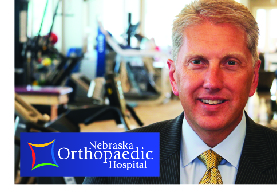
When it comes to the diagnostic, surgical and rehabilitation needs of people with sports injuries, joint replacements, or other musculoskeletal conditions, the Nebraska Orthopaedic Hospital (NOH) in Omaha is just what the doctor ordered. As the first hospital in the region dedicated to the complete care and treatment of the orthopaedic patient, NOH has experienced substantial growth since opening its doors in 2004. “We started out with about 130 employees and the majority of services were in the main hospital building,” CEO Tom Macy recalled. “Today, we have nearly 400 employees and have expanded our campus to include a rheumatology clinic, a 24-hour emergency department, a pharmacy, and outpatient surgery facilities.”
Approximately 75 percent of the hospital’s services are devoted to outpatient care, which includes the diagnosis and treatment of sportsrelated injuries. “The other 25 percent of our business is inpatient, which is total joint replacement,” Macy explained. “We’ve gone from 4,500 to over 9,500 surgeries per year. That includes about 1,200 total joint replacements annually.” Located at 144th Street and West Center Road, the main hospital has 24 beds and is equipped with the latest magnetic resonance imaging (MRI) technology, and physical therapy suites that include specialized hydrotherapy facilities.
“We offer physical therapy for individuals who are both surgical and non-surgical candidates. Physical therapy helps some patients delay or even avoid surgery,” Macy noted. “Physical therapy is also an important part of the recovery process following surgery.” Macy credited the hospital’s success over the past decade to the dedication of its professional staff in providing the highest level of patient care in the most cost-effective manner. Patient experience and satisfaction were important selection criteria for a pair of national awards presented this year to the Nebraska Orthopaedic Hospital.
The hospital was the recipient of a Women’s Choice Award as “America’s Best Hospital for Orthopedics” based on patient satisfaction measurements and clinical excellence. They also received the “Healthgrades Joint Replacement Excellence Award for 2014,” which recognizes the topperforming hospitals in the nation that have achieved quality excellence in particular specialties. In its ongoing effort to hold down administrative costs and protect patient information, Macy cited the hospital’s integration of a new electronic medical records (EMR) system. “That’s been a major change and will continue to be an evolving component in healthcare for some time to come,” he shared.
According to Macy, hospitals and healthcare organizations are responding to the population trend of leading more active lifestyles with programs that encourage health and fitness, such as the Market to Market Relay®, which NOH has sponsored for seven consecutive years. As the hospital celebrates its 10-year anniversary, Macy has been appreciative of the way Omaha and its surrounding communities have responded to NOH, and for the support of its business partners, including First National Bank. “Our relationship with First National predates the opening of the hospital,” Macy noted. “The hospital was a joint venture between 28 orthopaedic surgeons and the Nebraska Medical Center, which had a long-standing relationship with First National Bank. So choosing First National for our commercial needs was a natural fit.”
Over the years, First National has provided them with operating capital, equipment financing, an ATM, and credit card services. “We have a great partnership with First National and they have been very supportive of what we’ve wanted to do. They’ve given us everything we’ve needed,” Macy added.
Jacobo's Authentic Mexican Grocery, Bakery and Tortilleria - September 29, 2014
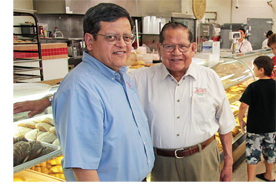
Since 1989, people with a need for authentic Mexican flavor, have found what they’re looking for at Jacobo’s Authentic Mexican Grocery, Bakery and Tortilleria, 24th and L streets. Owned by Ramon Jacobo and managed by his son, Carlos, this cashonly business has been a South Omaha tradition since 1976 when the family opened its first grocery at 30th and Madison streets. Three years later, the family opened a bakery at 24th and B, which later merged with the grocery store when it moved to its current location. “In the beginning, our customers were 90 percent Hispanic,” Carlos recalled. “Back then, people hesitated to go into a store that represented one nationality, thinking there might not be anything there for them, but there is. We urge people to come in and try something new and we’re always accessible to answer questions.”
Today, 50 percent of Jacobo’s customers are Hispanic and 50 percent represent other nationalities. “Now, we’re like the United Nations,” Ramon quipped. Among the store’s specialties are homemade chips and salsas; corn tortillas made fresh daily; deli favorites such as enchiladas, tamales, rice, beans and burritos; and traditional Mexican bakery items such as empanadas, conchas, and bolillos. Other departments include meat and produce sections, and packaged and canned goods manufactured in Mexico. “I got onto an airplane once and the flight attendant told me, ‘Mr. Jacobo, your salsa, chips and enchiladas are fantastic,’” Carlos recounted. “She added, ‘I’m based in Omaha and I always get them for our crew going from one city to another.’”
Ramon moved his family to Omaha from Chicago where he had worked for more than 20 years. “We decided to move back to Omaha where I was born, thinking maybe there’s a need for a Hispanic store here,” he explained. “When we opened the store at our first location, people didn’t think it was going to last,” Carlos acknowledged. “They told us there’s no demand for this type of market, but we were determined to give it a try.” For their first few years in business, Ramon drove round-trip from Omaha to Chicago every one to two weeks to load up his truck at warehouses specializing in Hispanic food products. “I would leave in the morning at 4 o’clock, drive to Chicago, load up, then drive back about 2 o’clock the next morning,” Ramon shared. “It was one of those things I never thought I would do in my lifetime, but I ended up doing it.”
Jacobo’s has experienced steady growth since those early days. The number of employees has grown from six to more than 20, and keeping the store’s shelves restocked requires semitrailer loads of fresh and packaged Hispanic food items. The Jacobos take pride in being part of the Omaha community and having the opportunity to educate people about Hispanic food and culture. They also value their business relationship with First National Bank, which started 25 years ago at the recommendation of another small business owner.
“At first, we thought First National was a big bank and we’re a small business, so we are not going to receive any attention from them,” Carlos noted. “We were told, ‘Try them, you’ll be surprised.’ So we started with First National and have been with them ever since.” Carlos added, “For us, it is important to deal with a bank that appreciates our business and we’ve seen that over the years with First National Bank.”
Interstate Batteries - September 22, 2014
For Travis and Tanya Hall, owning the Interstate Batteries distributorship in Omaha is a dream fulfilled. Travis’s career path with the company had started as a teenager growing up in Ponca, Nebraska, continued through his college years, and eventually led him to the corporate headquarters in Dallas, Texas, where he met Tanya. “The opportunity to purchase this distributorship was our dream,” Tanya recalled. “Given his extensive product knowledge and my experience as an accountant, it was a perfect fit for us. Our offer was made in May 2010 and six months later we took over.”
Located at 15505 Cooper Street in Omaha, the distributorship carries an inventory of 7,000 replacement batteries in a variety of sizes for use in automotive, trucking, motorcycle, agricultural, lawn and garden, and marine applications. The business covers a 13-county area in Nebraska and southwest Iowa that includes Omaha and Lincoln. “Our batteries are provided on consignment, so there are no upfront charges for dealers to carry our products,” Tanya explained. “We provide the dealer with a rack of batteries, which doesn’t cost them anything until a customer makes a purchase.”
The locally owned business operates three route trucks that make 30 stops per day at dealer locations that carry Interstate Batteries on consignment. During these visits, the route sales managers restock the dealer’s inventory and collect old batteries for recycling. “We rotate our batteries every 90 days at no cost to our dealers to make sure they are getting the freshest product available,” Travis shared. “We also make available a ‘hot shot’ vehicle for quick delivery of specialty batteries that a dealer may not have on consignment.” Travis is bullish about the growth potential of the battery industry. “Consider how many things we use every day that require a battery,” he observed. “As technology changes, opportunities will be created with new consumer and business products that rely on stored power.”
The Halls credit their employees with maintaining a high level of customer service. “We have an excellent team,” Travis noted. “Our employees are great and we hold ourselves up to a very high standard of customer service.” This summer, the Halls also acquired three All Battery retail stores in the Omaha area, increasing their total number of employees to 28. The stores provide batteries for a broad range of automotive, consumer and business products that require stored power. “The acquisition adds value to our existing dealer base and provides better service to the entire Omaha area,” Travis noted.
Prior to the acquisition, the All Battery stores were corporateowned. “Now they are locally owned, the same as our distributorship,” according to Travis, “which means nearly every dollar we spend is with local businesses in the Omaha community. And this helps every one’s business.”
The Halls acquired the All Battery stores with a business loan from First National Bank. “The acquisition would not have been possible without their help,” Travis acknowledged. “Our commercial banker is always ready to help us with whatever we need to succeed.” “The commercial bankers at First National have been fantastic to work with,” Tanya added. “They actually care about us, which is what you want in a bank if you have a business.”
The Filter Shop - September 15, 2014

When it comes to providing air filters for commercial and industrial applications, Ryan Dahlgaard doesn’t allow any dust to settle on his warehouse inventory. The owner of The Filter Shop in Omaha strives for an average inventory turnover of 30 to 40 days, allowing for seasonal variables. “In this business, you have to have the products available or the customer will go somewhere else,” Dahlgaard explained. “At the same time, you don’t want to keep product sitting around in the warehouse for years—you need to move it.” Over the past decade, expanding product lines and a steady increase in sales has forced The Filter Shop to seek more space at four different locations prior to occupying its current 20,000-square-foot office and warehouse at 8730 F. St.
Today, The Filter Shop is the largest distributor of Clarcor air filtration products and was recently recognized by the Gates Corporation for having the highest volume of belt sales in the Midwest. In addition to its extensive selection of heating, ventilation, and air conditioning (HVAC) filters, the company sells and installs air, liquid and dust filtration products, cottonwood intake screens, negative air machines, and replacement belts for HVAC applications. Serving a three-state area, The Filter Shop’s list of commercial and industrial customers reads like a Who’s Who of corporate headquarters, healthcare facilities, retail businesses, and manufacturing operations in the Midwest.
Customers can monitor and manage their product purchases and replacement schedules using FilterTrack, a free proprietary online service that Dahlgaard and a third party rolled out four years ago. The company operates four trucks that are used for deliveries by a team of National Air Filtration Association (NAFA) Certified Technicians responsible for replacing filters or other components. “It varies by application as to how often our technicians change out filters in a building,” Dahlgaard observed. “Some filters are replaced every two to three months. Our technicians will replace up to 600 HVAC filters in some of the larger office buildings we service, or as few as five or six in smaller facilities such as retail stores or restaurants.”
The market for filters offers “endless opportunities,” according to Dahlgaard. “Filters are a repeat business. It’s not one of those businesses where you sell them once and you’re done. Our challenge is to create a selling and service experience that turns our customers into ‘raving fans’ who want to come back again and again." Dahlgaard credits the company’s success to his Christian values and a strong culture of customer service fueled by motivated employees. “I am very excited that this team has taken air filters, which are far from a top-of-mind product for most people, and made this company into a business of choice for our customers,” Dahlgaard acknowledged.
Recalling his company’s early years, Dahlgaard appreciates the support and encouragement he received from his manufacturers and business partners, including First National Bank. “I’ve been with First National Bank since the day we started,” Dahlgaard noted. “It took us four years to turn a profit, but they were willing to work with me when others would not. First National, my accountant, and manufacturing partners are all team members who have supported what we’re doing from day one.”
Home Instead Senior Care - September 9, 2014

With more than 1,000 franchise locations in 17 countries, representing 1 million clients and annual revenues exceeding $1 billion, Home Instead Senior Care is recognized as the world’s leading provider of non-medical inhome senior care for seniors. For owners Lori and Paul Hogan, however, the potential for their company and the home care industry they helped create 20 years ago has yet to be realized. “There are 10,000 Americans turning 65 years old every day,” Paul explained. “Most of the aging adults we serve today are 78 to 80 years old, so we’re 10 years away from realizing the biggest demand for in-home senior care services ever seen.”
Studies show 85 - 90 percent of aging adults, regardless of the country they live in, desire to live out their lives in the comfort and safety of their own homes, according to the Hogans. Many seniors are not strong enough to push a vacuum cleaner any more, or maybe they forget to turn off the stove causing concern among family members,” Lori observed. “The adult children are often working, so we fill in with light housekeeping, meal preparation, and other services that enable seniors to remain in their own homes. We support families, we don’t replace them.” With more than 65,000 caregivers in its global network, Home Instead franchises provide more than 50 million hours of senior care annually. Approximately one-third of the company’s domestic and international caregivers are over the age of 60 years old.
The Hogans acknowledged that they have been blessed with amazing caregivers, franchise owners, and a dedicated staff at their global headquarters in Omaha where the business was founded in 1994. Home Instead evolved out of Paul’s background in franchising and personal experience helping his parents and siblings care for their 88-year-old grandmother. “We all chipped in to keep her comfortable for what we expected would be her last year,” Paul recalled. “That one year turned into 11 years and before long she regained her strength and was walking herself to church at Cathedral whenever the weather permitted.”
This year, the Home Instead Senior Care network entered Quebec, Canada, and the cities of Wuhan and Shenzhen in China. “We’re excited about the dynamics in China because there’s a growing middle class there that is looking for quality services and help with their older loved ones,” Paul acknowledged. Omaha is host city for the company’s annual convention, attended by more than 1,500 franchise owners and their supervisory personnel. The Hogans are also anchor donors for the Home Instead Center for Successful Aging at the University of Nebraska Medical Center in Omaha. “We’re thankful for the warm embrace we’ve received from Omaha over the years,” Paul noted.
The Hogans also appreciate the strong business relationships they have developed in Omaha, including the one with First National Bank, which is included on the company’s list of recommended resources for existing and new franchisees. “It’s great to have a bank right here in Omaha that can meet the needs of a company that’s doing business in other countries, as well as across North America,” Paul added. “First National offers services that are good for small businesses and large ones like ours, especially when it comes to handling currencies from around the world.”
2013 Business Spotlight
Johnny Sortino's Pizza Has the Right Recipe for Success | Johnny Sortino's Pizza: Sheri and Dana Taylor. December 2013.
Staab Management's Growth Plan Delivers | Staab Management Company (SMC): Ken and Dave Staab. November 2013.
McCarthy Capital is Investing in Growth | McCarthy Capital President: Patrick Duffy. September 2013.
Business is 'Cooking' at Kitchen Table | Kitchen Table Co-Owners: Colin and Jessica Duggan. August 2013.
Bes-Tech Generates Innovative Energy Solutions | Bes-Tech President and CTO: Mingsheng Liu. August 2013.
Thurston Manufacturing Is Geared Up for Growth | Thurston Manufacturing CEO: Layton Jensen. July 2013.
This Coin Laundry is a 'Classic' | Omaha Classic Coin Laundry Co-Owners: Patrick and Kathy Minikus. July 2013.
RV Market Drives Growth at Blue Ox | Blue Ox President: Jay Hesse. July 2013.
Global Industries Cultivates World-Class Brands | Global Industries, Inc. Chairman and CEO: Jack Henry. President and CFO: Doug Fargo. July 2013.
JNB Owner Is Driven to Succeed | JNB Inc. Owner and Manager: Brandon Priefert. June 2013.
Kirsch Transportation Shifts into High Gear | Kirsch Transportation Services, Inc. Co-Founders: Matthew Kirsch and Camilla Moore Kirsch. June 2013.
Sales Soar at Ultimate Disc Store | Extra Mile Sports LLC President and CEO: Chris Whirrett. May 2013.
International Bakery is On a Roll | International Bakery. Owner: Francisco Gonzalez. May 2013.
2012 Business Spotlight
Moving Water Keeps Briggs Pumped | Briggs Inc. of Omaha. Chief Financial Offer: Chris Sunde. Executive Vice President & Chief Operating Officer: Randy Beets. August 2012.
Accurate Communications Hits 'Speed Dial' to Growth | Accurate Communications. Owner: Jeff Zindel. August 2012.
Scooter's Coffee 'Scoots' to 100th location | Scooter's Coffee. Co-founders: Don and Linda Eckles. July 2012.
My Dream "Created a Wave" | Peachwave. Owner: Mahesh Devani. July 2012.
Markets, Location Favor Cedar Hill Cattle Co. Growth | Cedar Hill Cattle Company. Owners: Joe and Bill Sindelar. July 2012.
Finding a Lot to Love about Locating in Nebraska | WebEquity Solutions. CEO: Doug McGregor. June 2012.
Cupcakes Are Here To Stay | Jones Bros. Cupcakes. Owner: Bill Jones. June 2012.
When Bubble Burst, Charleston Built | Charleston Homes. President and Owner: Marc Stodola. June 2012.
Berries Hold Super Future for Westin | Westin Foods. President and CEO: Scott Carlson. June 2012.
A Wedding Setting in the Hills | Fountains Ballroom. Owners: Erin and Marty Williams. April 2012.
Omaha's Pull Too Strong to Resist | Trocadero. Owner: Alice Kim. April 2012.
Pedals to the People | Re-CYCLE Bike Shop. Owners: Mike & Cathy Turman. April 2012.









